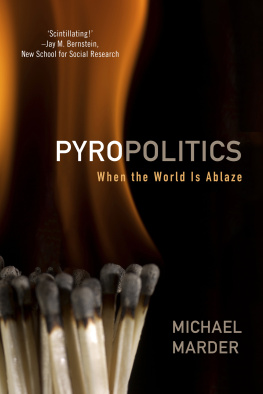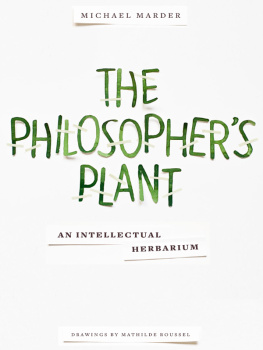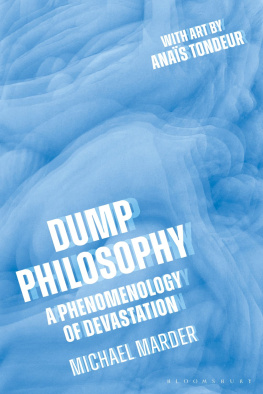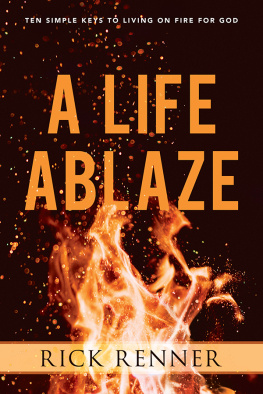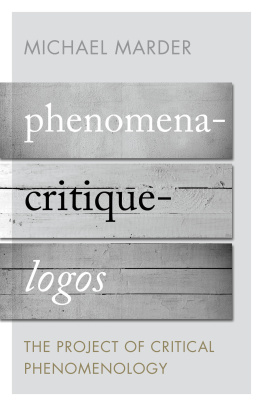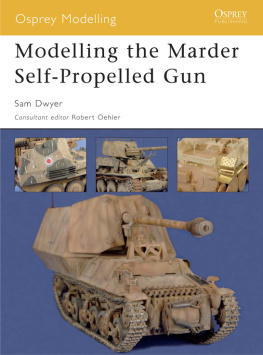Michael Marder - Pyropolitics: When the World Is Ablaze
Here you can read online Michael Marder - Pyropolitics: When the World Is Ablaze full text of the book (entire story) in english for free. Download pdf and epub, get meaning, cover and reviews about this ebook. year: 2015, publisher: Rowman & Littlefield, genre: Religion. Description of the work, (preface) as well as reviews are available. Best literature library LitArk.com created for fans of good reading and offers a wide selection of genres:
Romance novel
Science fiction
Adventure
Detective
Science
History
Home and family
Prose
Art
Politics
Computer
Non-fiction
Religion
Business
Children
Humor
Choose a favorite category and find really read worthwhile books. Enjoy immersion in the world of imagination, feel the emotions of the characters or learn something new for yourself, make an fascinating discovery.
- Book:Pyropolitics: When the World Is Ablaze
- Author:
- Publisher:Rowman & Littlefield
- Genre:
- Year:2015
- Rating:3 / 5
- Favourites:Add to favourites
- Your mark:
- 60
- 1
- 2
- 3
- 4
- 5
Pyropolitics: When the World Is Ablaze: summary, description and annotation
We offer to read an annotation, description, summary or preface (depends on what the author of the book "Pyropolitics: When the World Is Ablaze" wrote himself). If you haven't found the necessary information about the book — write in the comments, we will try to find it.
Pyropolitics: When the World Is Ablaze — read online for free the complete book (whole text) full work
Below is the text of the book, divided by pages. System saving the place of the last page read, allows you to conveniently read the book "Pyropolitics: When the World Is Ablaze" online for free, without having to search again every time where you left off. Put a bookmark, and you can go to the page where you finished reading at any time.
Font size:
Interval:
Bookmark:
Pyropolitics
Pyropolitics
When the World Is Ablaze
Michael Marder

London New York
Published by Rowman & Littlefield International, Ltd.
Unit A, Whitacre Mews, 26-34 Stannery Street, London SE11 4AB
www.rowmaninternational.com
Rowman & Littlefield International, Ltd. is an affiliate of Rowman & Littlefield
4501 Forbes Boulevard, Suite 200, Lanham, Maryland 20706, USA
With additional offices in Boulder, New York, Toronto (Canada), and London (UK)
www.rowman.com
Copyright 2015 by Michael Marder
All rights reserved. No part of this book may be reproduced in any form or by any electronic or mechanical means, including information storage and retrieval systems, without written permission from the publisher, except by a reviewer who may quote passages in a review.
British Library Cataloguing in Publication Information Available
A catalogue record for this book is available from the British Library
ISBN: HB 978-1-78348-028-9
ISBN: PB 978-1-78348-029-6
Library of Congress Cataloging-in-Publication Data Available
978-1-78348-028-9 (cloth : alk. paper)
978-1-78348-029-6 (pbk. : alk. paper)
978-1-78348-030-2 (electronic)
 TM The paper used in this publication meets the minimum requirements of American National Standard for Information Sciences Permanence of Paper for Printed Library Materials, ANSI/NISO Z39.48-1992.
TM The paper used in this publication meets the minimum requirements of American National Standard for Information Sciences Permanence of Paper for Printed Library Materials, ANSI/NISO Z39.48-1992.
Printed in the United States of America
,
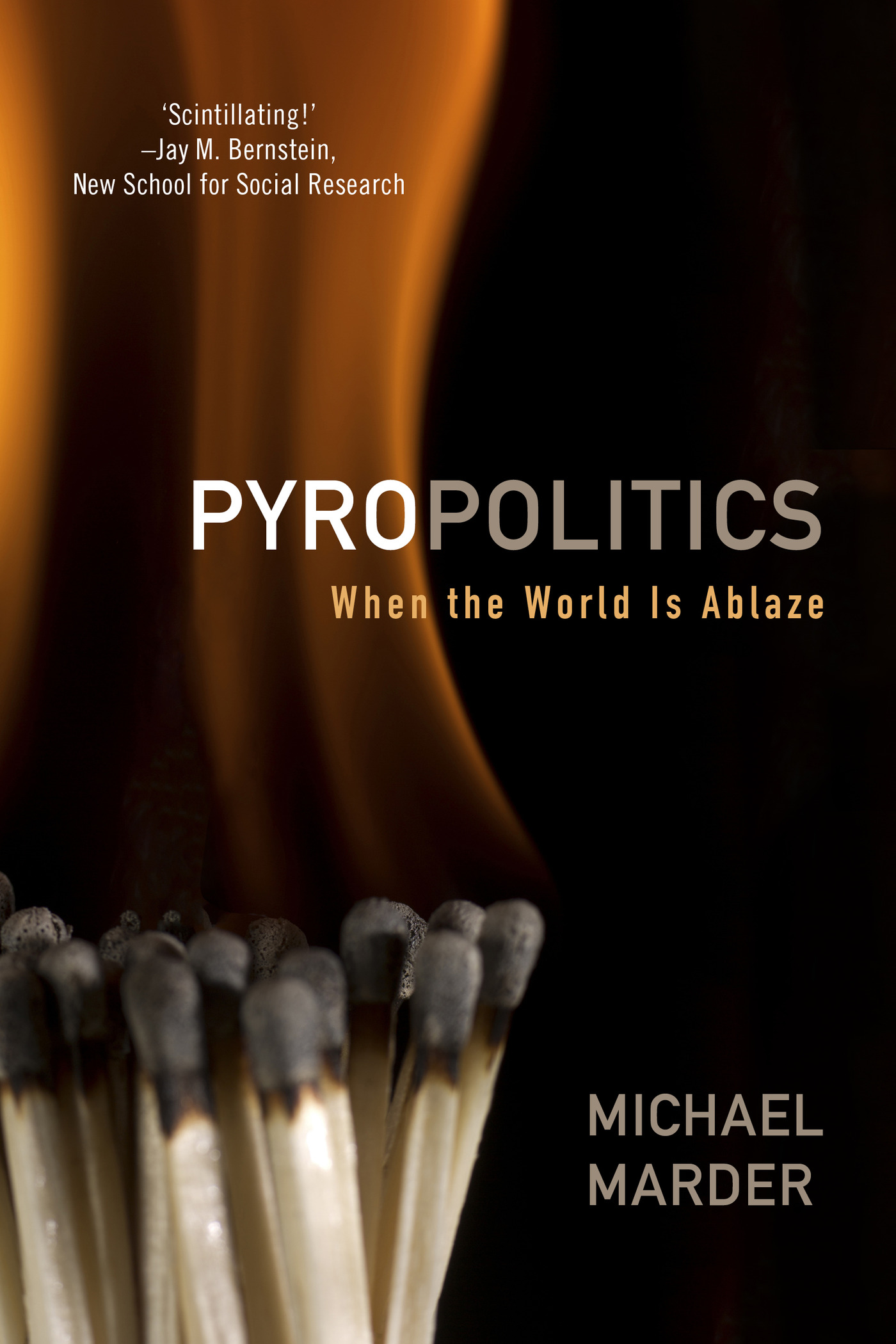
Pyropolitics was not an easy book to write. The double challenge it posed had to do with its at times grim subject matter, including the issues of self-immolation, extreme political violence and sacrifice, as well as with the need to elaborate an alternative to a purely geopolitical approach, without losing touch with materiality, practicality and the earth itself. Since 2011, Ive had the fortune to present parts of Pyropolitics before discerning and sophisticated academic audiences at York University in Canada, the University of Barcelona in Spain, Loyola University of Maryland in the United States, Diego Portales University in Chile and (remotely) University of Melbourne in Australia. I thank Shannon Bell, Santiago Zabala, Graham McAleer, Hugo Herrera, Lauren Rickards and Tom Ford for organising these events. In each case, the questions and debates sparked off by my presentations, prompted me to explain further and reformulate some of the ideas, accounting for the input of the participants in these sessions. I am grateful for their energy and enthusiasm, and I am certain that they will recognise traces of our conversations in the book. Marie-Claire Antoine kindly welcomed the earliest formulations of the politics of fire I shared with her. Anna Reeve and Sarah Campbell from Rowman & Littlefield International have been firm believers in this project since the first time I discussed it with them in London. My wife, Patrcia Vieira, has substantially improved the final manuscript of Pyropolitics and has sustained my thinking in more ways than I can express here. The book is dedicated to my grandparents, Rachel and Monya Gulberg, as well as to my great-grandmother Sarah Kotlyarevskaya, who helped kindle the love of learning in me.
In 2012, an early draft of chapter 1 was published under the title The Elemental Regimes of Carl Schmitt, or the ABC of Pyropolitics in a special issue of Revista de Ciencias Sociales (vol. 60), published at the University of Valparaiso, Chile, and focusing on the political philosophy of Carl Schmitt. In the same year, After the Fire: The Politics of Ashes, the basis for the conclusion to Pyropolitics, appeared in a special issue on Politics After Metaphysics of the journal Telos (vol. 161), which I edited. Parts of chapter 2 were published under the title The Enlightenment, Pyropolitics, and the Problem of Evil in Political Theology (vol. 16/2) in 2015. These texts are reproduced here with the permission of copyright holders.
February 11, 2012. Tenzin Choedon, an eighteen-year-old Buddhist nun from the Ngaba region in the Sichuan Province of China, torched herself, while calling for the return of the Dalai Lama from exile and demanding political freedom for Tibet. A few months later, on July 14 of the same year, Moshe Silman, an Israeli trying to make ends meet on a meagre state disability program and about to be evicted from his apartment, set himself on fire during a social justice demonstration in Tel Aviv. February 20, 2013. Varna, Bulgaria. Plamen Goranov self-immolated as part of antigovernment protests that swept the country and eventually led to the resignation of Prime Minister Boyko Borisov.
Fire, to which the three activists among countless others before and after have delivered themselves, gave them a voice but spirited away their bodies: la voix sans lephnomne (a voice without the phenomenon). It made visible an otherwise veiled oppression, injustice and violence by instituting another regime of visibility, abysmal and unsustainable. Did the voice (the ideal medium of expression and self-expression) gain more power as it resonated in international news outlets, in exchange for life itself? An impossible political phenomenology and an unfathomable economy of violence, to wit.
Momentarily shedding light on human suffering, fire speeded up and completed the work of destroying the abject victims of political and economic brutality, driven beyond the threshold of despair. (Was this our lightning, the fleeting moment of truth, which Martin Heidegger had extracted from ancient Greece via the poetry of Hlderlin? How many such lightnings are still bound to happen?) Rather than escape from the veritable furnace that fuels the growth of financial capital or the melting pot of a unified nation-state, as the case may be, the secular and religious martyrs who set themselves ablaze mediatised the true consequences of these merciless bonfires by throwing themselves there. In a brief and terrifying flash, the consequences of oppression became a public spectacle. What kind of a spectacle? Sublime? One, where the agents of self-immolation took phenomenality, the possibility of seeing and making sense, into their own hands, showing the rest of us the contours of an unjust world lit by black light and suffocating in the intolerable heat of suffering?
Perhaps weve already had a premonition of this obscure phenomenology all along, and the acts of Tenzin, Moshe, and Plamen give it only a more brazen form, which can strike as obscene only those of us who have the luxury of caring about and protecting our sensibilities. The world around us is disintegrating at such a vertiginous speed that any descriptions of its physical, social, economic, or political makeup yield but a series of nostalgic snapshots, similar to the black-and-white photographs of yesteryear capturing already outdated structures and processes. Buthere is the twistit is also building itself up through this disintegration. Neither the event nor the scale of the worlds crumbling is new: in the nineteenth century, Marx and Engels linked it to the expansion of the capitalist model that caused all that was solid to melt into air. What is unique today is how
Next pageFont size:
Interval:
Bookmark:
Similar books «Pyropolitics: When the World Is Ablaze»
Look at similar books to Pyropolitics: When the World Is Ablaze. We have selected literature similar in name and meaning in the hope of providing readers with more options to find new, interesting, not yet read works.
Discussion, reviews of the book Pyropolitics: When the World Is Ablaze and just readers' own opinions. Leave your comments, write what you think about the work, its meaning or the main characters. Specify what exactly you liked and what you didn't like, and why you think so.

